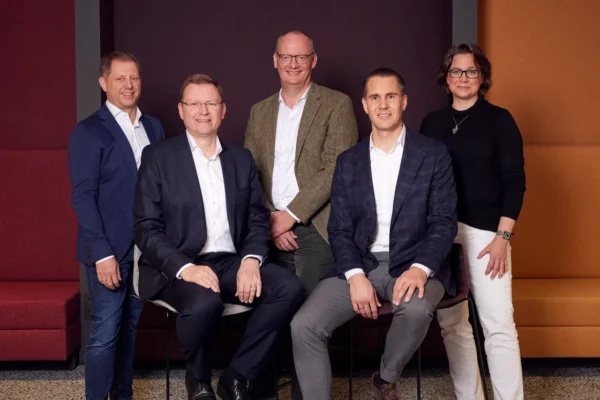If you want to get the pulse of what’s taking place at Ricoh USA and inside the Ricoh dealer community, the best person to speak with is Jim Coriddi, senior vice president of Ricoh USA’s dealer division. The Cannata Report interviewed Coriddi on January 30. In part two of our two-part interview, Coriddi offers his thoughts on the Ricoh-Toshiba partnership, a big rumor associated with that partnership, A4, acquisitions, artificial intelligence, and more.
If you missed part one of the interview, where we discussed Ricoh’s 2024 initiatives, which segments of the business are poised for growth, production print, and the decline of print, click here. The interview has been edited for clarity and brevity.
As you travel around and meet with dealers, what are they asking about the joint venture between Ricoh and Toshiba?
Jim Coriddi: When the announcement first hit, there were a lot of questions because everybody, let’s face it, we’ve all been waiting for some kind of consolidation. There was a lot of curiosity. After the first couple of weeks, this has been a non-issue.
Once we communicated what it meant and didn’t mean, everyone has just gone on with their business, especially because it’s all on the manufacturing side. It’s really not anything that has anything to do with the go-to-market or the marketing or the sales. Once our dealers learned that, at least the Ricoh dealers, it became a non-issue.
There has been some chatter about Ricoh eventually acquiring Toshiba, any thoughts on that?
Jim Coriddi: I’ll be perfectly honest; all I could say is I don’t know. You know as much about that as I do. We all can have opinions. We all can throw rumors out there. I have no idea. From everything that’s been made clear to me, this is purely a manufacturing move that seems to be a very intelligent move by two manufacturers. As far as what that means with the companies going forward, I truly have no idea. And I don’t think anyone, at least in Ricoh North America, could tell you anything other than that.
As far as the manufacturing partnership, how do you think this will improve your products?
Jim Coriddi: In the short term, it’s going to have no effect. In the long term, from everything we’ve been made to understand, the benefit would be scale and being able to maintain competitiveness for the long term.
I was recently interviewing a dealer who commented that some of the larger hardware OEMs tend to fall short in the A4 segment compared to Lexmark and HP. What’s Ricoh doing to offer more competitive products in the A4 space?
Jim Coriddi: Ricoh’s A4 line is very high quality. The issue is that it’s not expansive enough. What we have in color and black and white are among the best technologies in the industry. And when you go after a large account, an A3, A4, looking for that medium to high-level business-to-business solution, an A4 together with A3 on a common platform, you can’t get any better.
The issue at the lower and the higher end is that we need to bring in those solutions to take care of a broader range of customer needs. That is something that Ricoh is working feverishly on, and we hope to see more announcements. We just launched some new A4 products. We will be launching more within the next six months. There’s a lot going on to broaden that line.
One of the hottest trends in the industry right now is artificial intelligence. I was just at the Executive Connection Summit, and they had at least four panels exclusively devoted to it. Generally speaking, where is Ricoh going in that area?
Jim Coriddi: First of all, it’s on everybody’s mind and the minds of all of our dealers. Ricoh certainly has been deploying ChatGPT in some of our support capabilities. We’ve also been utilizing it to transfer customer knowledge. But the part that is exciting is what we’re doing with a lot of our direct customers, utilizing it for customer behavior dynamics, understanding more about the customer based on this information.
Quite frankly, we’ve also been utilizing it as a tool to detect differentials when we’re monitoring a network or a system. AI has been around for a long time. Right now, it has such a broad definition, but Ricoh has been involved with AI, and now that has really stepped up, as I’m sure every manufacturer is utilizing it. It is becoming a bigger and bigger part of how we do business.
Speaking of trends, what are some of the trends that you’re watching closely that are going to impact Ricoh and your dealers going forward?
Jim Coriddi: We talk about building out adjacencies with workflow and content management. What we’re looking at right now as we go through this digital transformation is the impact those initiatives are having on driving the core [business]. For example, a big part of what we look at, particularly coming out of the pandemic, is IT services. And that certainly, for certain dealers, has been a good business. For others, maybe not so much.
At the end of the day, in a lot of cases, it’s not aiding or expanding our position or securing our position in the core where there have been others. We see more and more out of DocuWare with content management, which is securing and growing our position in the core as well as adjacencies.
One of the trends we’re looking at very closely right now is what solutions are adding to the core and driving the core as opposed to just bringing a customer a solution that they’re happy with, which in some cases drives print volume down. We want to expand that to perform better in our core business.
Another one, certainly, and everybody’s sensitive to this, again, is where print is taking place. We’ve seen some dramatic declines in print volume in certain industries in the past couple of years, but others have held their own and are growing. When you look at a vertical, you look at SMB and education, that’s becoming more of a hotbed to go after those, securing that base because they’re printing more. You’re going to start seeing a more aggressive approach in those areas that have more print.
Looking at another obvious trend, we’re always writing about acquisitions, and some of your dealers are acquiring, or some are being acquired. Does that cause concern for you?
Jim Coriddi: It is changing the game, most definitely. The mindset has to be, how do we as a company put ourselves in a position to have success with whatever change takes place? We’ll start with what I would call mega dealers, the ones owned by equity partners; acquisition is a part of the formula.
With those entities, we have to look at ways to help make them be more efficient as a company because they’re becoming so large. We have to work together on the supply chain, take some of the costs out of the system, and integrate more. Because, obviously owned by equity partners, the cash position is very, very important. I’m just giving you an example.
Where our next level and Ricoh USA is very fortunate, we have a lot of significant-sized, independently owned dealerships. As they acquire, the manufacturers must secure their position and share within those entities. As we move on to more localized, what we would call mid-market dealers, those dealers need more support from Ricoh’s resources to help them become more solutions-oriented providers. Ricoh sees that as a strength because we have such a large direct entity that calls on the very largest of enterprise companies. We’ve built up a lot of those resources that we’ve put in play to share with our dealers.
What I’m saying more than anything is that when we look at the acquisition, we see it as a necessary opportunity because that’s where the industry is, so we have to look at how to best position ourselves. The risk comes in when, on the other end, we don’t find a way to do business or do better business with those entities that are making acquisitions.
Final questions, you’ve been with Ricoh for 40 years, are you just excited as you were that first day 40 years ago?
Jim Coriddi: This might sound trite, but the answer is yes. One reason has to do with something that’s been here the whole time, and one is new. The part that’s been here the whole time is the people. This really is a people industry. It is built on salespeople connecting with prospects and manufacturers working with dealers. I’ve been very, very fortunate. There are a lot of people on my team at this company that have been here 20, 25 years. There are many people who are committed and passionate about their jobs. I feel indebted to them and want to continue to develop the company going forward.
On the dealer side, I’ve been so fortunate that we work with, on a regular basis, these entrepreneurs, these great businesspeople, and you are always surrounded by this positive energy. And you know where they came from, all these tremendous stories, who started selling copiers out of a station wagon, and now they fly private planes. We’re able to work with those folks.
From a standpoint of what has stayed the same, what makes me excited and feel good about this is the people. The part that makes me want to show up in the morning is how much everything has changed. With that change, as I mentioned before, how much opportunity there is to build new strategies, new tactics, and new ways of having success as a company. For those two reasons, I’m still very excited about what I do.





